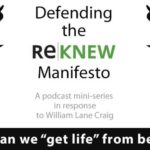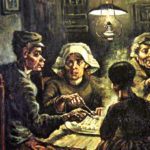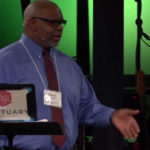We run our website the way we wished the whole internet worked: we provide high quality original content with no ads. We are funded solely by your direct support. Please consider supporting this project.

Feeding Our Hungry Hearts
Jesus came into a world that was full of hungry hearts (see previous post) to introduce us to the only thing that can feed those hungers. Jesus came to rescue us from the futile feeding frenzy of trying to feed ourselves on idols.
Throughout the Bible, we read story after story of people trying to find life outside of God. This is what the story of Adam and Eve is all about. Under the influence of the serpent, Eve embraced a deceptive, untrustworthy picture of God that caused her to stop trusting that God is the only source that can feed her heart. As a result, Eve was led believe that she could acquire life on her own.
This same story repeats itself today. Instead of relying on God to meet our needs, we try to meet them on our own. We all eat of the forbidden tree, just as Eve did.
The Bible calls this idolatry. Most modern westerners think that idolatry is about people worshiping a statue of some kind. But an idol is anything we treat as a god that we use to satisfy the hunger in our soul that only our Creator can satisfy. Such idols come in both religious and nonreligious forms.
Religious idolaters attempt to fill their hunger through religious activities they do or religious doctrines they believe, both of which they think will please their gods. Even when Christians try to get life from the rightness of their behaviors and beliefs instead of from God himself, they are guilty of idolatry.
Nonreligious idols come in the forms of sex, wealth, power—these seem to be the most prevalent. Others make idols of their nation, race, talents, looks, or fame. In fact, just about everything in the world is a potential idol, for just about anything can be used as a means of trying to fill our hunger.
Even if you manage to get what you are seeking through a specific idol, you know it’s just a matter of time before you lose it. There’s a multitude of competitors for the wealth, power, and fame you’ve acquired, and at some point they might gain an advantage over you. Even if you stay on top, you know it won’t last forever because age is never kind to idols.
What’s more, if your idols work, you know they do not completely satiate the hunger even while you enjoy them. The idols might distract us from the inner emptiness, but it never goes away.
The Bible calls this idolatry life in “the flesh.” It is full of anxiety, hopelessness, envy, strife, anger, and bitterness. The idolatrous world of “the flesh” is a competitive feeding frenzy of desperately hungry people trying to scarf up a morsel of fleeting worth from a limited number of idolatrous sources. Idolatry is at the root of most of the misery in the world.
Trace your own despair, anxiety, or bitterness back far enough, and more likely than not, you’ll discover there’s something other than God that you are clinging to as something to feed your hunger.
—Adapted from The Myth of a Christian Religion, pages 39-42
Category: General
Tags: Discipleship, Life in Christ, Life to the Full
Related Reading

Podcast: Defending the Manifesto (3 of 10)
Greg responds to challenges by William Lane Craig from Craig’s podcast “Reasonable Faith.“ In this episode Greg discusses getting life from Christ and not from “being right” about Christ. http://traffic.libsyn.com/askgregboyd/Episode_0058.mp3

Worst Sinner Award
Jesus taught: Do not judge, or you too will be judged. For in the same way you judge others, you will be judged, and with the measure you use, it will be measured to you. Why do you look at the speck of sawdust in your brother’s eye and pay no attention to the plank…

Are You Fully Alive? Here’s the Key
Image by rashdada via flickr. The cross reveals the full truth about us. This truth reconnects us with our true source of life, which in turn heals our idol addictions. This dimension of the cross is frankly so breathtakingly beautiful that, so far as I can tell, very few followers of Jesus have ever really grasped it.…

Podcast: Why Did Jesus Tell Us Not to Worry About Food When People Are Starving to Death?
Greg talks about worry in Matthew 6:26-27 and talks about the fact that people really die about the things that people worry about. http://traffic.libsyn.com/askgregboyd/Episode_0354.mp3

How Do You Balance Productivity and Spiritual Health?
In this episode Greg talks about balancing a productive life with a spiritually healthy one. Links: Book: Seeing is Believing http://traffic.libsyn.com/askgregboyd/Episode_0019.mp3

Who Are the BEST Teachers of What It Means to Be a Follower of Jesus? —Dennis Edwards
Dennis Edwards’ ReKnew Cross Vision Conference Keynote Dennis Edwards shares a fantastic message on why, generally speaking, marginalized Christians are the best *teachers* of what it means to be a follower of Christ. ____________
